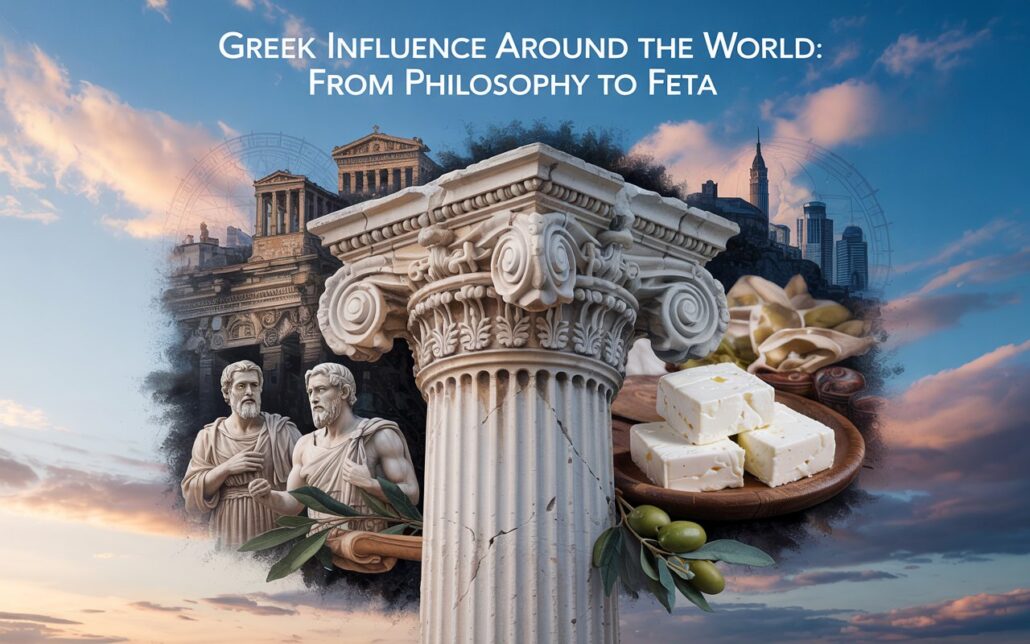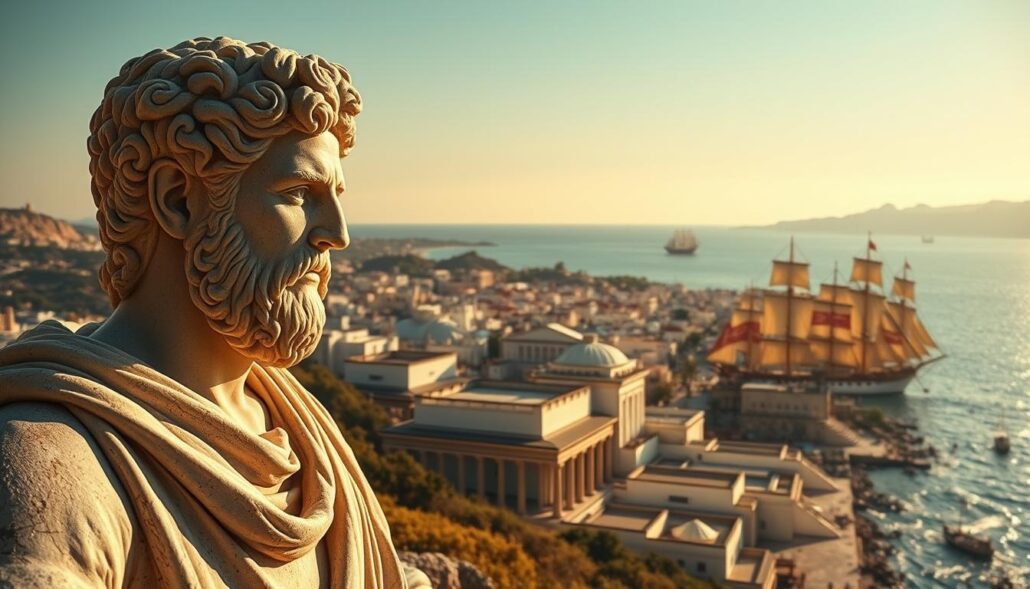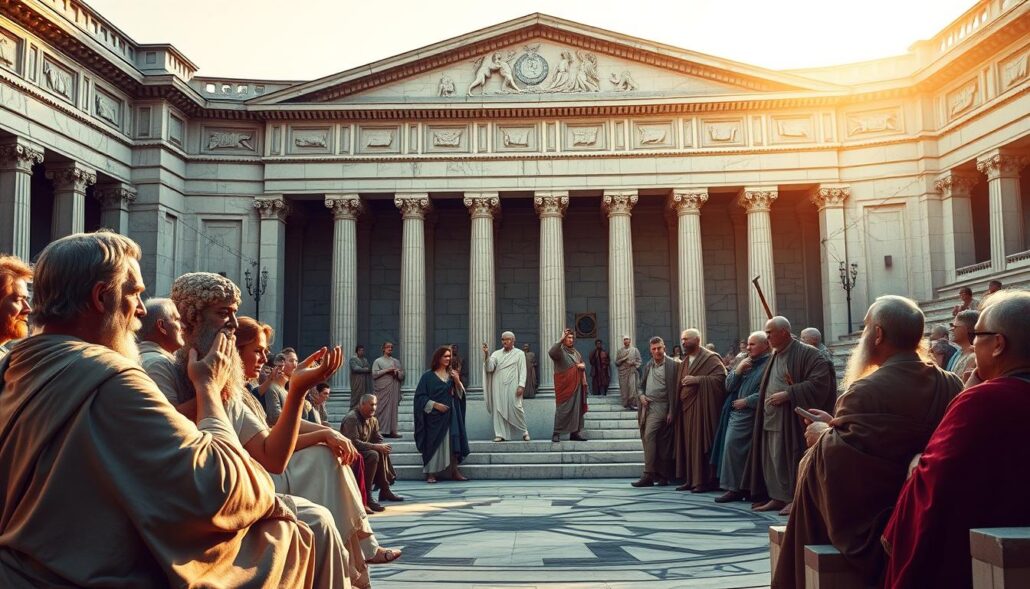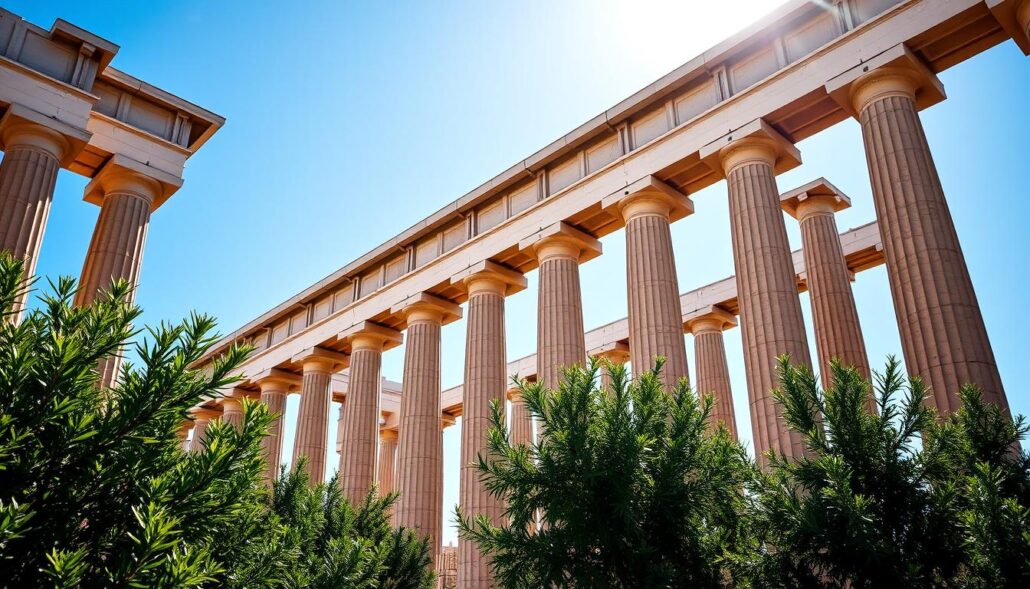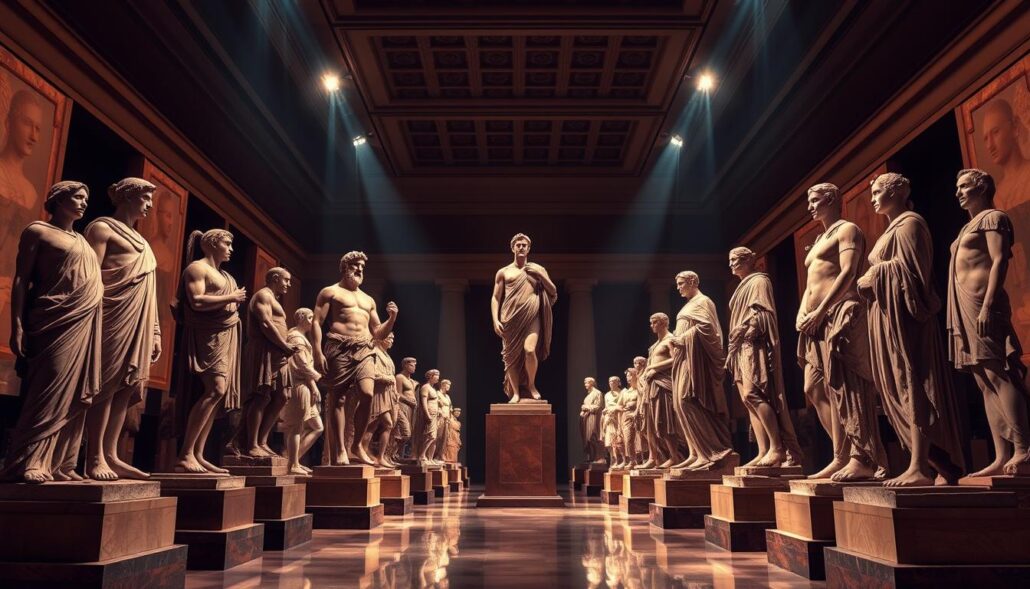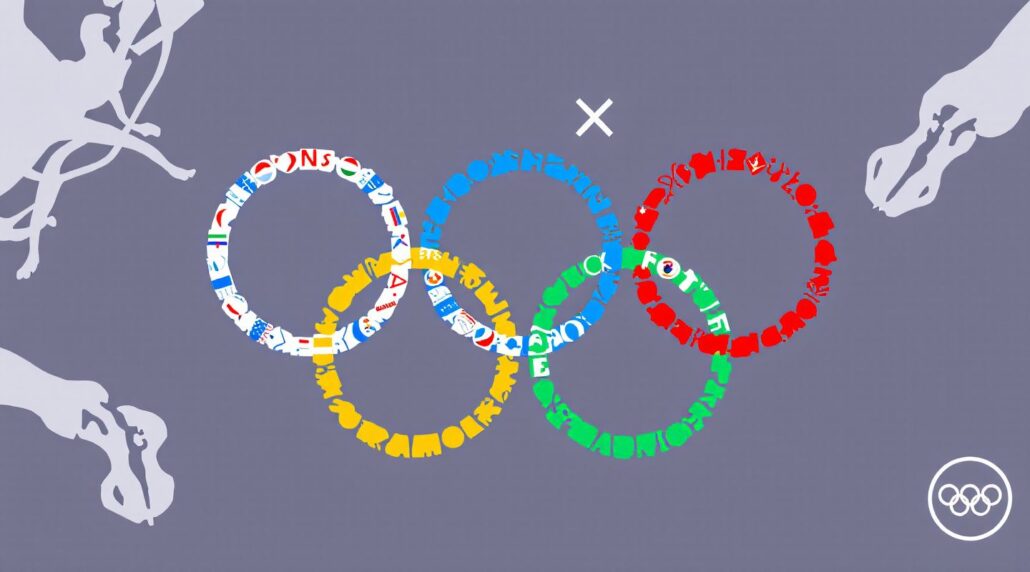Greek Influence Around the World: From Philosophy to Feta
Did you know that voting, food, and even words today come from ancient Greeks? They didn’t just shape history; they laid the groundwork for modern life. From democracy to feta cheese, Greek influence is all around us.
Hellenistic culture spread far and wide, mixing with other empires and ideas. Greek impact is seen in courts, science labs, and buildings. This shows how Athens and Sparta’s legacy lives on in our world.
Learn how Greek myths inspire movies, the Olympics reflect ancient games, and your gym’s name comes from ancient fitness. This article uncovers the hidden Greek threads that shaped our world.
The Cradle of Western Civilization: Understanding Greek Legacy
Ancient Greece’s legacy has shaped modern life in many ways. From 800 to 300 BCE, city-states like Athens and Sparta led in democracy, theater, and philosophy. This period, known as Archaic, Classical, and Hellenistic, set the stage for greek influence around the world.
Trade routes and colonies spread ideas across the Mediterranean. Alexander the Great’s conquests took hellenistic culture as far as Egypt and India.
- Archaic Period (800–480 BCE): City-states emerged, and the alphabet unified communication.
- Classical Period (480–323 BCE): Democracy in Athens and Socrates’ questioning methods began.
- Hellenistic Period (323–31 BCE): Alexander’s empire blended Greek traditions with local customs globally.
Today, greek heritage in different countries is seen in many places. Italy’s buildings inspired by the Parthenon, Turkey’s Ephesus ruins, and Egypt’s Alexandria Library—founded during Hellenistic times—show lasting impacts. Even modern terms like “democracy” and “theater” come from Greek words.
This legacy isn’t just history; it’s the base of art, science, and governance we use today.
The Foundation of Western Philosophy
The influence of Greek philosophy is key to how we think and seek truth. Their ideas shape ethics, science, and even self-help books today.
Socrates, Plato, and Aristotle: The Thinkers Who Changed Everything
- Socrates believed questioning leads to wisdom. His “Socratic method” is used in debates.
- Plato thought about ideal forms, mixing logic with metaphysics to understand reality.
- Aristotle organized knowledge in a systematic way. His work impacts biology and ethics.
How Greek Logic Shaped Scientific Inquiry
Pythagoras and Archimedes showed that nature has rules. This idea is the base of the scientific method. It tests hypotheses, not just assumes them.
Euclid used logic to create geometry. This is a key part of STEM education today.
Stoicism and Epicureanism in Modern Life
Stoicism teaches us to be resilient. It’s used in cognitive behavioral therapy (CBT). It shows we control our views, not events.
It’s used in workplace training and mental health. Epicurus believed in enjoying simple pleasures, not excess. This idea is part of mindfulness today.
As Epictetus said:
“It’s not events that bother us, but our views of them.”
This thinking is taught in stress management courses all over the world.
In courts and classrooms, the greek influence on modern society is clear. Their methods for finding answers are timeless.
Greek Influence Around the World: A Historical Timeline
From marble columns to modern constitutions, Greek ideas spread far beyond Alexander’s armies. Here’s how hellenistic culture changed societies around the world:
- 5th–4th century BCE: Greek colonies were found in Southern Italy (Magna Graecia), Naples, and Syracuse. France’s Massalia (modern Marseille) also had Greek settlements. The temples in Paestum, Italy, show the greek heritage in different countries.
- 323–31 BCE: Alexander’s conquests introduced Greek language and philosophy. In Afghanistan’s Ai-Khanoum, archaeologists found Greek theaters next to Buddhist stupas. This shows how cultures blended.
- 5th–10th century CE: Byzantine monks copied Plato’s texts while scholars in Baghdad translated Aristotle into Arabic. Greek math and medicine thrived in Baghdad’s House of Wisdom.
- 14th–17th century: The Medici family in Florence funded Plato translations. Scholars in Oxford debated Socrates’ ethics, sparking the Renaissance.
- 18th–21st century: Washington D.C.’s Supreme Court is inspired by the Parthenon. In India, universities teach Socratic methods. Brazil’s Rio de Janeiro has neoclassical buildings.
“The Greeks didn’t just build temples—they built the mental frameworks all civilizations now use,” said historian Mary Lefkowitz. She noted how democracy debates in ancient Athens are echoed in today’s parliaments.
From Egypt’s Ptolemaic pharaohs to the modern Olympic rings, Greek ideas are shared worldwide. This timeline shows their legacy is not just in museums. It’s alive in every law court, university, or debate today.
The Columns of Civilization: Greek Architectural Marvels
Greek architecture is known for its timeless beauty. It has shaped how we build and design today. The three main orders—Doric, Ionic, and Corinthian—are studied worldwide. Each order has its own unique style, from Doric’s simplicity to Corinthian’s floral details.
- Doric: sturdy, unfluted columns
- Ionic: slender scrolls on capitals
- Corinthian: ornate acanthus leaves
The Parthenon in Athens is a true marvel of greek architecture. It uses tricks of the eye to look perfect. Its design has set the standard for buildings around the world.
Today, you can see Greek influence in places like London’s British Museum and Berlin’s Brandenburg Gate. Even in Washington D.C.’s Supreme Court, you can see Greek touches. These buildings show the power and democracy of Greek design.
Ever seen a courthouse or museum with fluted columns or triangular pediments? These are nods to Greek architecture. From Sydney’s Parliament House to India’s Victoria Memorial, Greek designs are all around us. They didn’t just build temples; they inspired global civic pride.
From Marble to Museums: How Greek Art Defined Beauty
Ancient Greek art didn’t just create statues; it set the beauty standard for the world. From the Parthenon’s reliefs to today’s galleries, these ideals are seen in every curve and line. They celebrate human strength and harmony.
Sculpture and the Human Form
Artists like Phidias and Myron introduced techniques like contrapposto, making figures seem alive. The Venus de Milo, with its balanced proportions, inspires modern sculptures. Statues like the Discobolus taught us to see movement in stone.
Pottery and Decorative Arts
Hellenistic culture advanced pottery, turning clay into storytelling canvases. Black- and red-figure pottery told myths, while geometric patterns like meanders are in today’s textiles and tiles. These designs are found in home decor and fashion.
Greek Aesthetic Principles in Contemporary Design
Harmony and proportion, ancient Greek art’s core, shape modern spaces. Architects use the Parthenon’s symmetry in skyscrapers, while designers use classical columns in furniture. Even logos and websites use grid systems rooted in Greek ideals. Greek influence is seen in neoclassical buildings and the curves of vases.
Gods Among Us: Greek Mythology’s Global Imprint
Zeus, Athena, and Hercules were more than just ancient gods. They are timeless storytellers. Their stories of love, power, and tragedy continue to echo today. These myths shaped hellenistic culture and became a universal language of human experience.
Modern stories often draw from these legends. Books like Percy Jackson and films like Wonder Woman bring back Theseus and Amazon warriors. Brands like Nike (Athena’s shield) and Amazon (mythical female warriors) proudly show their Greek roots. Even psychology uses terms like “narcissism” and “Oedipus complex” to understand behavior.
- Literature: James Joyce’s Ulysses mirrors Odysseus’ journey.
- Astronomy: Planets and constellations bear names like Orion and Zeus’s lightning (Jupiter).
- Art: Salvador Dalí’s surrealism and Marvel’s gods-inspired characters.
“Myths are the DNA of storytelling—they shape how we confront life’s mysteries.”
Bollywood films and Japanese anime retell Medusa and Perseus, showing Greek mythology’s global reach. Its themes—hubris, fate, and heroism—resonate everywhere. Whether in a Hollywood blockbuster or a psychology textbook, the gods stay relevant, proving their legacy is timeless.
The Words We Speak: Greek Contributions to Language
Every day, Greek impact on language shapes how we talk. From textbooks to tech jargon, ancient Greek is heard in modern speech. It shows the greek influence around the world is very much alive. Let’s explore how these ancient roots continue to influence us today.
Everyday Words with Ancient Roots
English has thousands of Greek words. Think of “democracy” or “technology.” These words help us understand concepts like “ecology” or “philosophy.” Without Greek, we wouldn’t have words like “biology” or “geography.”
- Politics: “democracy,” “aristocracy”
- Education: “academy,” “pedagogy”
- Science: “mathematics,” “astronomy”
Science’s Greek Blueprint
Modern science uses Greek to name discoveries. “Atomos” (indivisible) became “atom,” and “bios” (life) gave us “biology.” Medicine uses Greek terms like “cardiology” (heart study) or “neurology.” This greek influence on modern society keeps Greek relevant in new fields like “cybernetics” (steersman).
Idioms Hiding in Plain Sight
“Achilles’ heel” warns of hidden weaknesses. “Pandora’s box” talks about unintended consequences. Even “Trojan horse” describes sneaky plans. These phrases carry Greek myths, adding ancient wisdom to our everyday conversations.
“Language is a living museum—Greek is its oldest exhibit.”
Next time you say “syntax” or “symposium,” you’re talking to the ancients. Greek’s influence isn’t just history—it’s part of our daily language. Look closer, and you’ll find its marks everywhere.
From the Mediterranean to the World: Greek Culinary Influence
The Mediterranean diet comes from Greek cooking traditions. It has shaped food culture around the world for thousands of years. Olive oil, herbs like oregano and thyme, and dishes like feta cheese and spanakopita show a focus on health and simplicity.
These ingredients are celebrated for their health benefits. They now inspire modern diets everywhere. This shows how Greek influence is seen in everyday meals.
Trade routes and migration spread Greek flavors far and wide. From gyros in Berlin to baklava in Istanbul, Greek recipes adapt to local tastes. But they always honor their origins.
Diaspora communities, from Australia to the US, keep Greek heritage alive with family recipes. Global chains like Souvlaki spots in London show how Greek staples thrive in cities.
“A plate of moussaka isn’t just food—it’s a passport to history,” says chef Katerina Papadopoulos. Her Athens restaurant blends traditional dishes with Nordic ingredients.
- Feta cheese became an EU-protected product, symbolizing cultural pride.
- Gyro meat on pita echoes ancient kleftiko recipes, now a fast-food favorite.
- Herb-infused yogurt dips like tzatziki appear in fusion menus from Tokyo to Toronto.
Today, farm-to-table movements follow ancient Greek principles. They focus on seasonal eating and local sourcing. Whether in a New York taverna or a Sydney café, Greek cuisine connects past and present. It shows its lasting influence around the world.
Democracy and Beyond: Greek Political Innovations
Ancient Greece’s political experiments deeply influenced greek influence on modern society. The Athenian assembly’s debates on laws and leadership paved the way for today’s democracies. Yet, their original limits, like excluding women and slaves, show how far these ideals have come.
From town halls to global summits, the greek heritage in different countries is a key part of modern governance.
Democratic Principles and Their Evolution
Athens’ bold idea of citizen-led decisions sparked the first democracies. Back then, only male landowners could vote. Today, greek influence around the world includes universal suffrage in places like India and Brazil.
Modern constitutions, from Canada to South Africa, reflect Athenian ideals of public deliberation.
Citizenship and Participation
In ancient Greece, being a citizen meant being actively involved, not just voting. Today, civic duties like jury service in the UK or community voting drives in Kenya show this legacy. Schools worldwide teach how Greek ideas transformed “citizen” into a global value.
Greek Political Thought in Modern Governance
Philosophers like Aristotle asked, “What makes a just state?” Their answers are in today’s constitutions. The US Bill of Rights and the EU’s human rights laws draw from Greek debates.
Countries like Iceland and Costa Rica use direct democracy methods inspired by Athenian assemblies.
Olympic Spirit: From Ancient Competitions to Global Celebration
The ancient Olympic Games were held in Olympia, Greece. They combined sports with religious rituals. Athletes competed in races, wrestling, and chariot racing under Zeus’s watch.
A sacred truce was called during the games, stopping wars. These events became a symbol of Hellenistic culture. They brought city-states together in a shared celebration.
“L’important, c’est de participer.” (“The important thing in life is not the triumph but the struggle.”) — Pierre de Coubertin
In 1896, Pierre de Coubertin brought back the Games. He drew inspiration from ancient values of physical prowess and greek heritage in different countries. Today’s Olympics reflect these ideals.
The torch relay is a nod to ancient times. Marathons honor Pheidippides’ legendary run. And the olive wreath, now medals, symbolizes achievement.
- Athens 2004 reused Panathenaic Stadium’s marble paths.
- Rio 2016 featured Parthenon-inspired stage designs.
- Paris 2024 plans to spotlight Greek architectural motifs.
Modern Olympics showcase greek influence around the world more than ever. From Sydney’s 2000 opening ceremony to Tokyo’s 2020 digital flame, host cities honor Greek traditions. Today, the Games celebrate diversity, welcoming athletes from over 200 nations.
Every flame lit, every podium raised, connects us to a 3,000-year-old tradition. The Olympics are more than sports. They are a bridge between cultures, a living link to the ancient world’s unity through competition.
Conclusion: The Eternal Greek Legacy
Greek influence is a key part of our global culture today. Ideas like democracy and the Olympic Games are alive and evolving. Greek traditions show up in buildings, languages, and even food, like feta-stuffed pita.
Today, we debate digital democracy and AI ethics, just like Socrates did. The Parthenon’s design inspires modern skyscrapers, and medical terms like “cardiology” come from Greek. Greek values like reason and justice are loved worldwide.
Museums like the British Museum keep ancient artifacts alive. But the real legacy is in how these ideas inspire new inventions.
Think about voting, watching marathons, or using “encyclopedia” next time. Each connects us to ancient times. How will future generations use these lessons? The answer might be in finding a balance between old and new.

